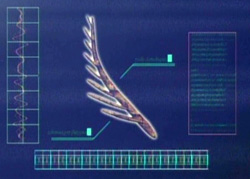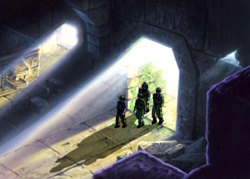|
Fossils
are ancient, mostly rock-like structures containing the remains and
subsequently DNA of Pokémon species.
There is, in effect, two types
of Pokémon Fossils - Naturally made and manmade. This article shall be
focusing mostly on the latter.
Manmade fossils (or "Datenvo"
as they were referred to during the era of their creation) were artefacts
constructed by
Pokemopolitan scientists as a means of storing the DNA
codes of various Pokémon species. In theory, this would have given the
scientists freedom to use this data to create as many members of that
species as they wished.
Many Datenvo were unearthed
during an archaeological expedition through the ruins of what appeared to
be a Pokémopolitan Laboratory, led by
Dr. Phineas Fuji. Amongst the
discoveries lay the DNA codes of some of the most powerful Pokémon known
to exist. A good number of those Datenvo have since been transferred into
the care of Prof.
Jonathan
Schuyler.
While scientists have had some
minor success with retrieving Pokémon data from naturally-made fossils,
most notable results have been achieved from the Datenvo. However, energy
types and levels play a very important part upon the success of an
experiment.
For example, scientist
Butler Maturgé's
attempts to recreate Groudon failed as after channelling too much
aura
through a Datenvo, resulting in an oversized creature with an unstable
physical structure.
|

A Mew Datenvo, unearthed by the archaeological
team belonging to Dr. Fuji.

A Groudon Datenvo, unearthed by Butler Maturgé.

The Pokémopolitan laboratory where cloning
experiments were thought to have been carried out. |